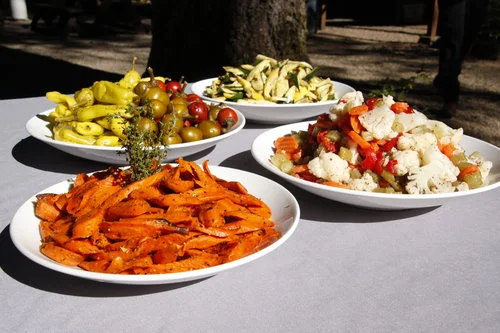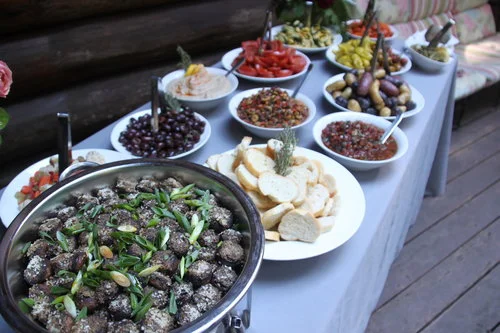Food for Thought How to: Working with Veg-Friendly Caterers
You’re involved with a nonprofit which has been contemplating adopting a more animal- and earth-friendly menu policy—yet you still have some lingering questions. Does this sound familiar? To start, it’s amazing that you’re looking to align your mission and your actions to save even more lives and to help protect our planet! It’s also understandable to have concerns or inquiries, just like with any type of change.
One of the most common questions we hear is “How does our organization work with caterers on creating a vegan/vegetarian menu for our upcoming event?” Since we are very fortunate to have a staff member, Barb, who is actually also a vegan caterer, we thought it may be helpful for her to share her knowledge on this very topic via an interview with fellow staff member, Allie!
Interviewer: Allie Gunter, West Coast Coordinator (San Diego, California)
Interviewee: Barbara Troyer, Food for Thought Wildlife & Environmental Coordinator and Caterer at A Broken Angel Sustainable Catering and Food Cart (Bend, Oregon)
Q: What tips do you have for someone who is looking to work with a veg-friendly caterer for the first time?
A: Even if a caterer is all plant-based, they probably have a cuisine or cuisines they specialize in. Take the time to review a caterer’s website and social media accounts, then contact them and provide as many specifics about your event as you can and ask for their catering menu. Some catering companies or chains may have pre-set menus and price lists, but for high-end catering, don’t expect a quote without speaking with the caterer first about your event details. Many chefs want to work with you on your special event and will take the time to talk with you about your needs and expectations, then create a customized quote based on the expected headcount and other factors.
If you’re able to find an all-vegan caterer, I would contact them first as they specialize in delicious and creative plant-based foods. However, if this is not an option in your area, many caterers are now offering vegan entrées alongside their other menu items. If they do (or are looking to do) a substantial amount of vegan catering, their catering menu will reflect this. Even traditional restaurants and caterers are sometimes willing to take on a creative challenge and will work with you to produce crowd-pleasing options. This is a win for both your event and for the caterer, as a successful catered event can draw new business and showcase the diversity of the chef. I’ve noticed caterers commenting after preparing an all-vegan spread that they found the process exciting and plan to offer more vegan options going forward for other clients.
Q: What made you decide to offer vegan food for your own catering business?
A: Creating a vegan catering business (and food cart) was a natural fit for myself and my chef partner, Richard Hull. I’d been a long-time vegan activist and dreamed for years about opening a food cart or other food business. Chef Hull is French-trained and brought 20+ years of experience in restaurants from his own bistro, to head chef at multiple award-winning restaurants, to high-volume hotel catering departments. When Richard relocated to Oregon and had a personal lifestyle change, he utilized his talent and training in developing a new Southern American vegan cuisine. Or as I often tell customers, “He turned his magical talents onto plants and never looked back!” I brought years of casual vegan cooking experience to the team as well and have happily expanded into the roles of baker and fermenter for A Broken Angel. Operating both the food cart and catering business allows us to offer our community two very different types of vegan cuisines: cart art (street food) and high-end catering (weddings, parties, and so on). What both have in common is savory and approachable food with no reliance on mock meats or fake anything.
Q: What is your personal favorite vegan food item you make?
A: I can tell you that our customer’s favorite food cart item is probably the biscuits and gravy (I make the biscuits, Richard makes the gravy). Personally, I love toasted English muffins in the morning with avocado, garden tomatoes, homemade sauerkraut, capers, and a bit of salt and pepper. Sometimes I’ll add a little Miyoko’s cream cheese. I also enjoy chickpeas cooked almost any way, and baking and devouring a good cinnamon roll. But I love the taste of Field Roast products too, so meals don’t always have to be made from scratch!
Q: What trends do you see happening in plant-based foods?
A: Veganism continues to be a top consumer trend and as a result, more people than ever are expecting vegan options at events. In fact, a Top Trends in Prepared Foods in 2017 report highlighted that the number of vegans in the U.S. grew 600% in 3 short years! Numerous studies have also reported that reduced meat consumption is key to reversing climate change. At the same time, many more options are available to consumers in stores like aged cheeses and savory sausages and burgers, and plant-based meats and lab-grown meats continue to improve in texture and flavor and become more widely available. Although there are some cooks that rely heavily on these substitutes, I’m seeing more vegan chefs starting to branch out into specialized cuisines that minimize the usage of mock meats and cheeses.
Q: What are the most common ingredients you use to substitute for eggs, dairy, etc.?
A: Almond milk is our go-to for so many recipes from biscuits to griddle cakes to savory dishes. Cashews are a staple as well for crème sauces. Refined coconut oil is cut in for butter in baked goods and used in many other ways. We include a variety of mushrooms in our savory dishes (I mentioned earlier that we don’t use mock meats for the food cart or catering). Occasionally, I’ll use flax or chia in place of eggs or gelatin, or aquafaba (from chickpeas).
Q: What is something you wish your clients knew ahead of time when working together?
A: We’ve catered for some nonprofits and private clients who may eat vegan themselves but have many guests or family members who are not as familiar with plant-based eating. I would suggest that they not emphasize the fact that the meal will be vegan. If asked, describe the type of cuisine and courses in such a way that it sounds enticing! Don’t start out by saying, “Well, it’s all vegan…” We don’t talk about meat-centric meals that way. Imagine if every time someone referred to Italian food, for instance, as meat-based Italian food. So why should we say, vegan Italian food? It’s just good food.
Thank you to Barb for sharing her wisdom on plant-based catering!
The guests at your next fundraising or sponsored event will be singing the praises of your choice to serve menu items that further the impact of your organization’s scope—whether they are personally plant-based themselves or not!






